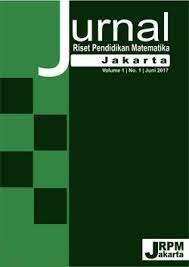Pengaruh Model Pembelajaran Student Teams Achievement Divisions (STAD) pada Pembelajaran Jarak Jauh terhadap Kemampuan Penalaran Matematis Di SMPIT Avicenna Bekasi Utara
Pengaruh Model Pembelajaran Student Teams Achievement Divisions (STAD)
DOI:
https://doi.org/10.21009/jrpmj.v2i1.23451Keywords:
Model pembelajaran kooperatif tipe STAD, kemampuan penalaran matematisAbstract
This study was conducted to determine whether there is an effect of the STAD learning model on distance learning on students' mathematical reasoning abilities. The research was carried out at Avicenna Junior High School, North Bekasi in the seventh grade of the even semester of the 2020/2021 school year on the subject of Quadrilaterals and Triangles. The research method used is quasi-experimental. Sampling using simple random sampling technique. Simple random sampling technique is done by randomly selecting two classes from four classes that are normally distributed, homogeneous, and have the same average to be used as the experimental class (STAD type cooperative learning model) and control class (conventional learning model). The research instrument used was a final test of mathematical reasoning abilities on the subject of quadrilaterals and triangles as many as 6 items of description that had passed content, construct and empirical validity tests. Based on the test results of pre-treatment data analysis prerequisites, the experimental class and control class were normally distributed and homogeneous. Therefore, the statistical hypothesis testing used a t-test with a significance level of = 0.05. Based on the calculation of statistical hypotheses, = 2.8075 and = 1.6772. The value of > . so reject 0 and it can be concluded that there is a difference in the average scores of students' mathematical reasoning abilities, with the average mathematical reasoning ability test scores of experimental class students being higher than those of the control class. This shows that there is an effect of the application of the STAD type cooperative learning model on the mathematical communication skills of Avicenna SMPIT students. The amount of influence based on the calculation of Cohen's effect size is 76% which is included in the medium category.
References
Ario, M. (2015). “Penalaran Matematis dan Mathematical Habits of Mind Melalui Pembelajaran Berbasis Masalah dan Penemuan Terbimbing, Edusentris. Bandung: Jurnal Ilmu Pendidikan dan Pengajaran Sekolah Pascasarjana Universitas Pendidikan Indonesia. Vol. 2. No. 1. hlm. 43.
Baroody, Arthur J., Erin E. Reid, dan David D.Putra. (2012). “An Example of a Hypothetical Learning Progression : The Successor Principle and Emergnece of Informal Mathematical Induction”. Savannah: Paper presented at the International STEM Research Symposium. hlm. 2.
Depdiknas. (2003). Undang Undang Sistem Pendidikan Nasional Nomor 20 Bab 1 Pasal 1 No. 15. Jakarta: Depdiknas.
Depdiknas. (2013). Peraturan Pemerintah RI Nomor 32 Tahun 2013. Online. http://hukum.
bmkg.go.id/vifiles/PERUBAHAN%20ATAS%20PERATURAN%20PEMERINTAH%20NOMOR%2019%20TAHUN%202005%20TENTANG%20STANDAR%20NASIONAL%PENDIDIKAN.PDF. Diakses 11 Maret 2020
Gunawan, I. (2016). Pengantar Statistika Inferensial. Jakarta: PT Raja Grafindo Perkasa.
Herman, T. (2007). “Pembelajaran Berbasis Masalah untuk Meningkatkan Kemampuan Penalaran Matematis Siswa SMP.” Bandung: Jurnal Cakrawala Pendidikan. Vol. XXVI. No. 1. hlm. 42.
Jihad, A., Haris, A. (2010). Evaluasi Pembelajaran. Yogyakarta: Multi Pressindo.
Kompas. (2016). “Daya Imajinasi Siswa Lemah.” Online. http://nasional.kompas.com/read/2. Diakses 11 Februari 2019.
Lestari, K. E., Yudhistira, M.R. (2017). Penelitian Pendidikan Matematika. Bandung: PT Refika Aditama.
Lie, Anita. (2005). Cooperative Learning (Mempraktikkan Cooperative Learning di Ruang-Ruang Kelas). Jakarta: Grasindo.
Matondang, Z. (2009). “Validitas dan Reliabilitas suatu Instrumen Penelitian.” Medan: Jurnal Tabularasa. Vol. 6. No. 1. hlm. 87.
Minarni, Ani. (2010). “Peran Penalaran Matematik Untuk Meningkatkan kemampuan Pemahaman Masalah Matematik Siswa, Prosidinh.” Bandung: Seminar Nasional Matematika dan Pendidikan Matematika Universitas Pendidikan Indonesia. hlm. 479.
Munawaroh, I. (Oktober 2005). Virtual Learning dalam Pembelajaran Jarak Jauh, dalam jurnal Majalah Ilmiah Pembelajaran nomer 2, Vol. 1
Munir. 2009. Pembelajaran Jarak Jauh Berbasis Teknologi Informasi dan Komunikasi. Bandung: Alfabeta
National Council of Teacher of Mathematics. (2016). “Participles and Standarts fo School Mathematics.” Reston VA: NCTM. hlm. 4.
Programme for International Student Assessment. (2016). “PISA 2015 Results: Excellence and Equity in Education.” Paris: EOCD. Vol. 1. No. 44.
Puspendik. (2016). Hasil TIMSS 2015. Jakarta: Pusat Penilaian Pendidikan, Badan Penelitian dan Pengembangan Kementrian Pendidikan dan Kebudayaan. Online. http://puspendik.
kemdikbud.go.id/seminar/upload/Hasil%20Seminar%20Puspendik%202016/TIMSS%20infographic.pdf. Diakses 11 Februari 2020.
Slavin, Robert E. (2005). Cooperative Learning: theory, research and practice. London: Allymand Bacon.
Sudjana. (2002). Metode Statistika. Bandung: Tarsito.
Sugiyono. (2010). Statistika untuk Penelitian. Bandung: Alfabeta.
Suriasumantri, J. S. (2009). Filsafat Ilmu Sebuah Pengantar Populer. Jakarta: Pustaka sinar Harapan.
Suprapto. (2013). Metodologi Penelitian Ilmu Pendidikan dan Ilmu Pengetahuan Sosial. Yogyakarta: CAPS.
Tim Pengembang Ilmu Pendidikan. (2007). Ilmu dan Aplikasi Pendidikan. Bandung: PT. IMTIMA.
Trianto. (2009). Mendesain Model Pembelajaran Inovatif-Progresif. Jakarta: Kencana Prenada Group.
Wardhani, S. (2008). Analisis SI dan SKL Mata Pelajaran Matematika SMP/MTS untuk optimalisasi Tujuan Mata Pelajaran Matematika. Yogyakarta: Pusat Pengembangan dan Pemberdayaan Pendidik dan Tenaga Kependidikan Matematika.
Wardhani, S. (2008). Paket Fasilitas Pemberdayaan KKG/MGMP Matematika. Yogyakarta: Departemen Pendidikan Nasional.
Warsito. (2007). “Peran TIK dalam Penyelenggaraan PJJ”. Jakarta: Jurnal Teknodik. Vol. 1. No. 20. hlm. 9-41.
Wartono. dkk.. (2004). Materi Pelatihan Terintegrasi Sains. Jakarta: Departemen Pendidikan Nasional Modul 38.
Yuniarti, Y. (2007). “Meningkatkan Kemampuan Penalaran dan Komunikasi Matematis Siswa Sekolah Menengah Pertama melalui Pembelajaran dengan Pendekatan Inkuiri.” Bandung: Tesis Fakultas Pendidikan Matematika dan Ilmu Pengetahuan Alam Universitas Pendidikan Indonesia. Tidak Diterbitkan.




